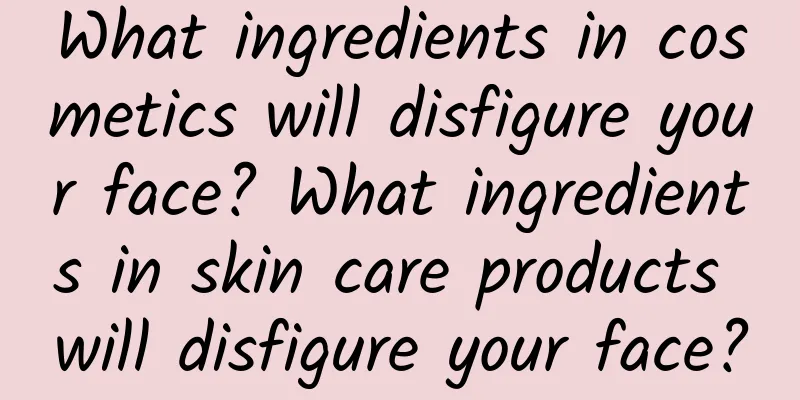What ingredients in cosmetics will disfigure your face? What ingredients in skin care products will disfigure your face?

|
Many chemical ingredients are added to skin care products. Different chemical ingredients have different effects. Some ingredients are bad for the skin if used too much. Let’s take a look at the skin care ingredients that are harmful to the human body. What ingredients in cosmetics will disfigure your face?Alcohol will make the skin dry and dehydrated, and make the skin sensitive. Salicylic acid will damage the skin's stratum corneum, reduce the skin's resistance and cause redness and allergies. Fruit acid, like salicylic acid, will make the skin thinner and more sensitive, and will make the skin darker if used during the day. Mercury is the most harmful ingredient, which can damage the liver, kidneys and spleen. Arsenic can cause dermatitis, pigmentation, and skin cancer. Lead can damage the body's hematopoietic and reproductive systems. Cadmium can induce heart disease and damage bone tissue. What in skin care products can ruin your appearance?Mercury, arsenic, lead, and cadmium are banned ingredients in cosmetics. Skin care experts have listed the hazards of mercury, arsenic, lead, and cadmium to the skin, which has led many people to mistakenly believe that these heavy metals are also components of cosmetics. But in fact, the "Cosmetic Hygiene Standards" of the People's Republic of China stipulates that mercury, arsenic, lead, cadmium and compounds of these substances are prohibited as cosmetic components [2]. In other words, these metals are banned ingredients in cosmetics and should not appear in the list of cosmetic ingredients. However, since cosmetics may be contaminated by mercury, arsenic, lead, etc. during the production process, the "Cosmetic Hygiene Standards" also stipulates the total amount limit for possible pollutants in cosmetics. Limits for the total amount of common contaminants in cosmeticsCareful readers have discovered that mercury has one more note. The "organic mercury preservatives" (phenylmercuric salts, thimerosal) mentioned in the note can only be used in eye cosmetics and eye makeup removers in cosmetics, and their concentration limits are 0.007% (in terms of mercury), and must be indicated on the cosmetic label. The U.S. Food and Drug Administration (FDA) points out that mercury compounds in cosmetics will be absorbed by the skin and accumulated in the human body, which may cause allergies, skin irritation and neurotoxic symptoms. Therefore, except for eye cosmetics, it is strictly prohibited to use them in other cosmetics. At the same time, the FDA also stipulates that mercury compounds are only allowed to be used when there are no other safe and effective eye cosmetic preservatives available, and the concentration must not exceed 0.0065% (in terms of mercury). Although my country's standards for the use of organic mercury preservatives in eye cosmetics are not as strict as those stipulated by the FDA, as long as cosmetics manufacturers comply with national regulations, trace amounts of organic mercury preservatives in cosmetics should also be safe for the skin. At the same time, it is now rare to see eye products using organic mercury as a preservative. If you are really worried, you can stay away from these two preservatives when you see them on the label. Therefore, mercury, arsenic, lead, and cadmium are banned ingredients in cosmetics and should not appear in the ingredient list of qualified cosmetics, so they cannot be considered as "disfiguring" cosmetic ingredients. Alcohol is a controversial ingredient, but it is far from disfiguring The addition of alcohol can make cosmetics feel more refreshing and have a stronger sense of penetration. Many cosmetics with the concept of "introduction" will add alcohol to help the active ingredients in the cosmetics dissolve and penetrate the skin. This is to cater to consumers' demands for the function and feel of cosmetics. However, the high permeability and volatility of alcohol make it irritating to the skin and may cause inflammation; when it evaporates, it will also take away moisture from the skin surface, causing dry skin. At the same time, studies have shown that acute or chronic alcohol exposure may increase reactive oxygen free radicals, thereby causing tissue damage [4]. However, this damage is mainly caused by free radicals during alcohol metabolism, and there is no more direct research on skin aging caused by external use. There are reports that disinfection with 70% alcohol causes contact dermatitis. It can only be speculated that when used topically, the high permeability of alcohol causes irritation and inflammation, causing skin damage. In fact, the alcohol concentration in cosmetics is usually not high. If alcohol appears in the last few places on the cosmetic ingredient list, you don't need to worry too much; only when it appears in the first few places on the ingredient list, you may have to worry about causing dry skin or dermatitis. Of course, people who are sensitive to alcohol should try to avoid contact with alcohol. (If swelling into a "pig head" due to allergies is considered disfigurement, then alcohol can really cause "disfigurement". But the skincare expert really said disfigurement, without even putting quotation marks, which is a bit exaggerated.) Reasonable use of salicylic acid and fruit acid is beneficial to the skin Salicylic acid and fruit acid are widely used in cosmetics. There are clear restrictions on their use in the "Hygienic Standards for Cosmetics", including concentration and minimum pH value. The relevant provisions of the "Hygienic Standards for Cosmetics" on salicylic acid and fruit acid (α-hydroxy acid). The large picture is here. The 2003 supplement of the "International Journal of Toxicology" specifically evaluated the safety issues of salicylic acid and its derivatives in skin care products, and concluded that reasonable use of salicylic acid is safe]. Salicylic acid can safely remove keratin as a skin conditioner, especially the aged keratin on the inner wall of pores. At the same time, its anti-inflammatory effect can also be used to treat common acne, and reasonable use will not cause irritation. It also does not cause genetic toxicity, and is neither photosensitizing nor phototoxic. Studies have also shown that salicylic acid derivatives have certain anti-aging effects, but the effect is relatively weak. Therefore, salicylic acid can be used safely at appropriate concentrations and pH values to deal with a variety of skin problems. Fruit acid belongs to α-hydroxy acid, and lactic acid from milk, malic acid in apples, citric acid in lemons... are all fruit acids. Although most of the fruit acids used in skin care products are now chemically synthesized, with glycolic acid and lactic acid being the most common, there is no essential difference between them and fruit acids from natural sources. Fruit acids have moisturizing, exfoliating, and anti-inflammatory effects. Fruit acids also have the effect of increasing epidermal thickness and inducing the expression of hyaluronic acid and collagen in the dermis. However, fruit acids require a suitable pH value and appropriate concentration to work. The concentration of fruit acids in general skin care products is less than 10%. Higher concentrations are used by surgeons for chemical peels to treat melasma, solar keratosis, seborrheic keratosis, keratosis pilaris, etc., and need to be performed by doctors in hospitals. The fruit acids that play an exfoliating role in cosmetics generally have a concentration of more than 4% and a pH value of less than 4. When the concentration is low or the pH value is neutral, fruit acids mainly play a moisturizing role. Although fruit acids increase the skin's sensitivity to ultraviolet rays, this sensitivity is reversible and can be protected by strengthening sun protection. (Even if fruit acids are not used, sun protection is essential in daily skin care.) What to add to cosmetics to hurt your faceCosmetics containing lead, mercury, alcohol, formaldehyde, preservatives, etc. will harm the skin and affect the health of the body. For example, the content of hydroquinone, mineral oil, monoethanolamine and diethanolamine in the product must be strictly controlled. Exceeding the standard will also cause harm to the face. Mercury is often used in freckle creams, and cadmium and lead are mostly used in lipsticks. Lead exceeding the standard is greater than 40 mg, so you must pay attention when purchasing. Frequent use of alcohol can easily cause thinning of the stratum corneum and allergies, so it should be used appropriately and used with caution on sensitive skin. |
<<: Can pregnant women use Freeplus facial cleanser? Is Freeplus safe for pregnant women to use?
>>: Which is better, Sephora or the counter? What level is Sephora?
Recommend
What is the principle of Thermage and what are the characteristics of Thermage
In order to improve skin sagging, many friends wh...
What grade does Meikang Zindai belong to? How are Meikang Zindai products?
As we all know, there are many cosmetic brands on...
What can beauty sponges be used for? Can beauty sponges be used to apply sunscreen?
Everyone is familiar with beauty eggs, which are ...
Does Proya Sailing Sunscreen contain alcohol? Can Proya Sailing Sunscreen be used if you have acne?
Sunscreen is a very important skin care product. ...
How can I quickly get a vest line?
Have you ever envied others' good figures and...
The difference between skin care and no skin care. Is there a big difference between skin care and no skin care?
Many people have the habit of skin care, but ther...
Can eye shadow be used as blush? Can eye shadow be used as eyebrow powder to draw eyebrows?
Eye shadow is a very common cosmetic nowadays. Be...
Is the Inno Little Brown Bottle useful? What is the Inno Little Brown Bottle?
Skin care is something that many people pay atten...
Analysis of ingredients in Shu Uemura's small square bottle How long can Shu Uemura's small square bottle be used
Shu Uemura's small square bottle foundation i...
Do I need to apply a mask before putting on makeup? How long after applying the mask is it best to put on makeup?
Many girls think that putting on a mask before pu...
Is makeup remover oil suitable for acne-prone skin? What should I pay attention to when using makeup remover oil?
Makeup remover oil has a strong makeup removal po...
How is MAXAM Almond Oil Moisturizing Cream? What are the effects of MAXAM Almond Oil Moisturizing Cream?
MAXAM is a facial cream that many people like to ...
How to control hunger during weight loss How to control hunger during weight loss
When losing weight, we not only need to exercise ...
Are neck wrinkles related to being fat? Will neck wrinkles disappear if you lose weight?
Neck wrinkles are a skin problem that many people...
Will ear cartilage tip padding cause piercing? What should I do if ear cartilage tip padding fails?
There are many cases of failed plastic surgery on...









